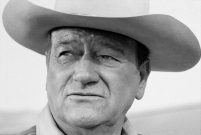When the Ugly is the Good
I saw Clint Eastwood make the briefest of introductions of candidate Richard Nixon in 1968: “There are three choices in this race—the good, the bad, and the ugly, and I’m here to present you with the good.” Minimalism.
Eastwood’s now notorious GOP convention rambling riff on President Obama was no less artistic, reflecting his own audacity as an actor and director. While reducing Obama to an invisible man spouting unheard obscenities, Eastwood made a plainspoken case against his re-election. “You, we –we own this country…. And when somebody does not do the job, it’s time to let them go.”
Eastwood employed the esotericism of Al-Farabi’s ascetic who disguises himself as a drunkard. The renegade, seemingly stumbling improvisation protected the Establishment convention managers by giving them plausible deniability. Eastwood brought with him his anti-bureaucratic Dirty Harry (was this not the dirtiest negative ad of all?) and his pre-political, “no-name” western heroes. His characters confirm for us that the rule of law requires, at various key moments in a nation’s history, individuals who are above it but nonetheless respect it—likewise the theme of many a John Wayne movie.
But more to the point here, Eastwood was also channeling, in delivery and purpose, vox populi Jimmy Stewart in Mr. Smith Goes to Washington (link no longer available). Recall him saying he cried when Obama was elected and cried when he saw the unemployment go to 23 million, and then view Mr. Smith at the Lincoln Memorial.
Law professor Ann Althouse observed that “Millions of folks who didn’t bother watching the convention are watching Eastwood’s performance out of the context within which it was anomalous. They’re watching viral video.” He was “seemingly speaking straight from his head”—what people yearn for most in political speech. And, FWIW, the Washington Post in its long profile of an independent voter noted that she “loved” the Eastwood moment. The lethality of Eastwood’s 11 minutes was confirmed by President Obama who was obliged to say that he did not “take offense” and remained a “great fan” of him—though this clearly did not make his day.


